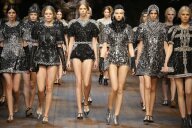The annual spate of outrage over the non-revelation that models are, indeed, skinny reared its predictably tedious head during Sydney’s Mercedes-Benz Fashion Week last week. This time around, the casting of ultra-slim Cassi Van Den Dungen by the notoriously thin-obsessed designer Alex Perry – who once inferred that a size eight teenage Australia’s Next Top Model contestant was “fat” – was the primary source of controversy.
Perry has since served up a crocodile tear-laden, half-arsed apology, blaming a “serious lapse of judgement” and recounting the disgust he claims to have experienced upon viewing footage from his own show.
Unsurprisingly, I call bullshit. There would have been various opportunities for designers and agents to express their concerns over the weight of models throughout the catwalk selection process and the many fittings and rehearsals. Notably slender models like Van Den Dungen and Nicole Pollard don’t just slip through the cracks.
Perry is an accomplished designer whose brand has repeatedly thriven on controversy, and this year he generated precisely the reaction and ensuing (free, might I add) publicity he was blatantly seeking. But the industry folk who capitalised on the opportunity to hop on the condemnation bandwagon – chief among them Jackie Frank, the editor of Marie Claire, a magazine that once upheld genetically-blessed supermodel Jennifer Hawkins as a poster girl for positive body image (as though Hawkins’ beauty queen good looks and figure are plausibly attainable to the average Australian woman) – don’t exactly have a leg to stand on.
And so we persist in our well-intentioned but ultimately misguided fist-shaking. The reality is that the problem neither begins nor ends with either Perry or the Evil Misogynist Fashion Industry. Nor is the issue attributable to individual models that engage in unhealthy eating practices (or “The Hunger Games” as social commentator Mia Freedman facetiously dubbed it) in order to stay thin, many presumably doing so for the sole sake of securing their next job; remember, not all fashion models are on Miranda Kerr’s salary. Of course, it goes without saying that there are women in the fashion world who are simply naturally thin.
Don’t get me wrong – I have no doubt that the fashion industry is rife with vapid, relentlessly money-hungry arseholes – much like any profit-driven industry, really. And therein lies the rub. At the end of the day, the fashion industry – by which I mean agencies, designers, advertisers and magazines – is a business, and businesses have no vested interest in promoting sentimental things like self-esteem and positive body image.
On the contrary, self-loathing is a lucrative (and by no means untapped) market. The fashion industry is just one chunk of a whole cluster of industries that collectively and strategically normalise an unachievable, fantasy image of women in order to fuel the costly and inevitably futile pursuit of an aesthetically flawless version of ourselves. Heck, instilling women with a deep-rooted dissatisfaction about their unsightly physical mediocrity is the fashion and beauty industries’ business model – and a hugely profitable one at that.
But I don’t buy into the notion that we’re passive victims in all of this. For all our righteous indignation, society shares an equal moral burden in the negotiation of social norms, and many of us are complicit in the perpetuation of unattainable, and often unhealthy, ideals. How many of us have indulged in the purchase of magazines with emaciated models plastered on their front cover? And how many of us did so because, despite knowing better, we quietly aspired to look like that?
How many of us continue to support brands like Urban Outfitters (I refer to their shamelessly creepy “Eat Less” shirt, which was viewed by many as an endorsement of the Pro-Ana movement)? Once again, the fashion industry is a business – and businesses respond to consumer demand. We can continue to engage in this cycle of manufactured outrage, but the cold hard truth is that we have a choice, and it’s time we addressed our own hypocrisy.
As long as the fashion industry believes that society will ultimately tolerate their bad behaviour (at least implicitly, via our continued consumption of brands and magazines that essentially glorify emaciation), a misguided annual hissy fit – followed by the usual wave of apathy and collective amnesia, only to repeat the cycle all over again come next year – is a miniscule hurdle to overcome.
Ultimately, sanctimony is self-gratifying, and we’ve passed the point of diminishing returns on the predictable pseudo-piety.

















No Comments